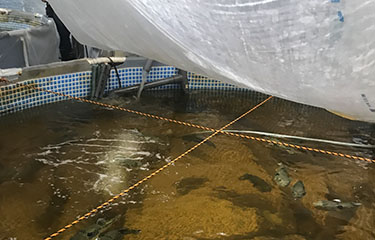Japanese company utilizing vacant buildings for land-based aquaculture

Cutting capital expenditures and placing production facilities near the market are two keys to profitable land-based aquaculture, and a Japanese company is achieving both these goals by re-purposing vacant urban buildings.
Aqua Stage, established as a spin-off from Willstage, is a company based in Kusatsu City, Shiga Prefecture, Japan developing commercial aquaculture facilities using new water purification technology in abandoned buildings. So far, the company established three aquaculture facilities in Shiga prefecture. One was built in a converted abandoned school in Koka City.
The company started when Willstage Founder and CEO Yoshi Otani saw a need to prevent algae growth to maintain clean water for children to play in commercial water features. Willstage is involved in developing commercial facilities that often feature a plaza with some water, such as a pond or reflecting pool, and Otani made it a mission to create technology that would keep the water clean.
As part of his drive to find a solution, he began studying water purification technology and worked on combining various bacteria that could break down algae. However, his solutions did not completely decompose the algae, so he invented a grinding device that could crush algae, food residue, and fish droppings so that the bacteria could more easily decompose it. The new solution worked, and has been added to cleaning systems for the ponds and moats of several well-known historical grounds, like Byodo-in Temple in Uji, Kyoto, and the Imperial Palace in Tokyo.
The company claims its patented purification device can use the same water for up to a year, without replacement, but only replenishment – replacing that lost through evaporation.
The water purification abilities of the new device led to Otani founding Aqua Stage to capitalize on its use in aquaculture. A key benefit of the technology is that it removes nitrogen in water and makes water useable immediately for aquaculture, as opposed to most RAS systems, for which time is required to build up an effective ecosystem of bacterial growth. The system leans into trends in land-based aquaculture system development that seek to eliminate the risk of parasitic diseases that cause high mortality in ocean-farmed systems.
Otani founded the company in 2018, with support of the Shiga Agriculture, Forestry, and Fisheries Growth Industrialization Investment Limited Partnership – an investment fund set up by the Shiga prefectural government to encourage innovative new businesses in the prefecture. Other shareholders include key suppliers and partners, including a fish distributor.
The company began with trial cultivation of two species: tiger pufferfish and flounder. Pufferfish as a first species is based on prevailing trends. Additionally, pufferfish that are raised in tanks do not contain toxins in the skin or organs, as the toxin of wild pufferfish comes from bacteria in the shellfish and starfish that they consume.
To make his system more environmentally friendly, Otani said Aqua Stage is developing aqua feed that incorporates invasive reeds and aquatic plants. The company is aiming for eventual Aquaculture Stewardship Council (ASC) certification.
The company’s school-based facility is currently a research and development center targeting development of other species. The full list of target species for the company includes tiger puffer, flounder, mackerel, filefish, cherry salmon, Biwa trout, Japanese river eel, tiger prawns, vannamei shrimp, and sea bream. The company is also preparing to put a roof over the school’s outdoor pool to use it as a fish tank.
Using a vacant building isn't without problems, however.
“The biggest challenge in using the school facility is that it gets too hot in the summer and too cold in the winter,” Tasuya Fukami, who works in Aqua Stage’s technology department, told SeafoodSource. “Fish are weak when it comes to changes in temperature. We heat or cool the water in the tanks directly, but we don’t control the room temperature.”
Fukami said the heating and air-conditioning systems for the school are shut down, and the company did not add special fans or other ventilation to the structure, so mold growth also needs to be kept under control.
Tiger pufferfish that have been cultured for about 1.5 years weigh between 1 and 1.5 kilograms. One feature of the biological purification is that water in the tanks becomes a brown color. Fukami said that this is the color of organic matter (e.g., humic substances) that bacteria cannot decompose, and it is harmless to fish. Fumaki said evidence indicates the organic matter might actually be beneficial. A 6 November article in Livestock and Poultry, Middle East and Asia suggests that it is beneficial for the stress resistance of fish.
As the next step in expansion, Aqua Stage's parent company, Wellstage, signed a joint research agreement with property management company Urban Renaissance, to use other vacant buildings for aquaculture. This will be the first time Aqua Stage engages in land-based aquaculture outside of its own facilities, and serve as a test case to see whether land-based aquaculture is a suitable use for vacant buildings.
The Urban Renaissance Agency and Aqua Stage will begin farming experiments for flounder, filefish, and vannamei shrimp at a vacant facility in the Shintamon housing complex in Tarumi Ward, Kobe City, Hyogo prefecture. The companies expect the flounder and filefish will grow to marketable size in one year, and vannamei shrimp in six months.
The facility is a two-story reinforced concrete building that used to be a clinic and a residence, and it is located in an area for commercial facilities in a housing complex. The land is zoned as a neighborhood commercial area, and a farm of up to 150 square meters can be located there. Five water tanks with a capacity of two to four metric tons have been installed on the first floor of the building.
Within three years, Otani said he hopes to utilize as many as 30 idle facilities such as closed factories and warehouses for land-based aquaculture.
Photo courtesy of Aqua Stage






Share